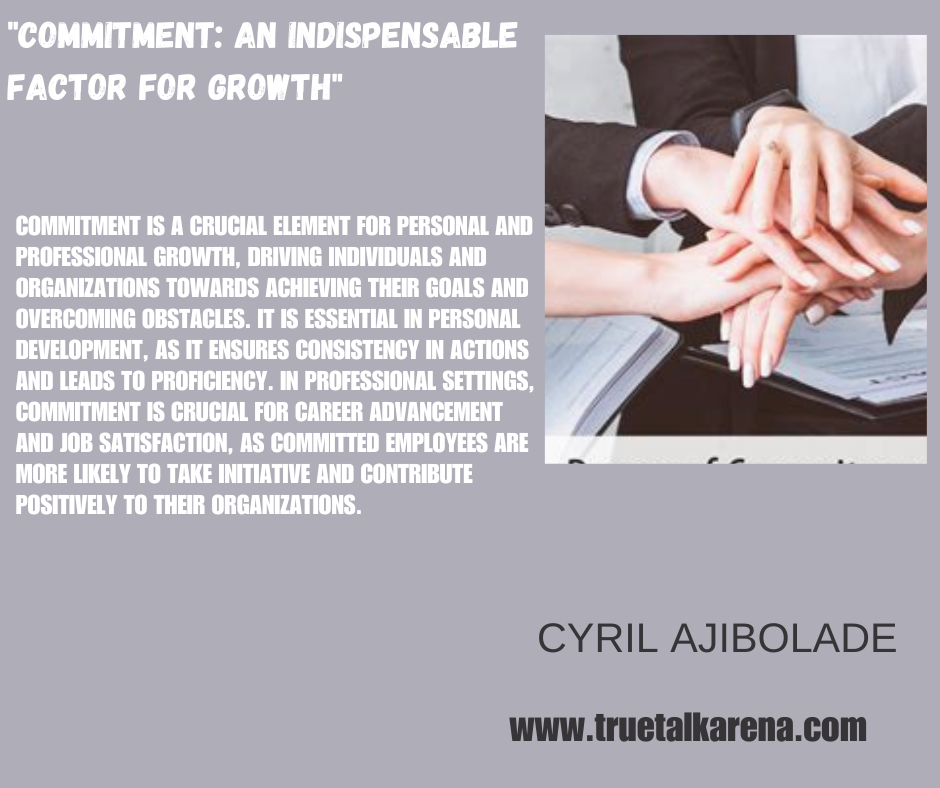
COMMITMENT:AN INDISPENSABLE FACTORY FOR GROWTH
Commitment, an unwavering dedication to a course of action, purpose, or task, is an essential ingredient for personal and professional growth. It is the fuel that propels individuals and organizations towards achieving their goals, overcoming obstacles, and realizing their full potential.
This essay delves into the multifaceted nature of commitment, exploring its role in fostering growth, its psychological underpinnings, and practical strategies for cultivating this invaluable trait.
The Role of Commitment in Growth, whether personal, professional, or organizational, is seldom a linear process. It is often marked by challenges, setbacks, and periods of stagnation.
Commitment serves as the bedrock upon which resilience and perseverance are built, enabling individuals to navigate these tumultuous periods with unwavering focus and determination.Personal GrowthIn the realm of personal development, commitment manifests as the sustained effort towards self-improvement. Whether it is mastering a new skill, pursuing higher education, or adopting healthier lifestyle habits, commitment ensures consistency in actions. For instance, an individual committed to learning a musical instrument must practice regularly, despite the initial difficulty and slow progress. This consistent effort eventually leads to proficiency and the fulfillment of personal aspirations.
Professional Growth in professional settings, commitment is crucial for career advancement and job satisfaction. Employees who demonstrate commitment to their roles are more likely to take initiative, seek out opportunities for learning and development, and contribute positively to their organizations. For example, a committed employee may volunteer for challenging projects, attend professional development workshops, or pursue further qualifications, thereby enhancing their skill set and career prospects.
Organizational Growth at an organizational level, commitment from leadership and employees is fundamental to achieving strategic objectives and sustaining competitive advantage. Committed leaders inspire and motivate their teams, fostering a culture of excellence and accountability. Similarly, when employees are committed to the organization's mission and values, they are more engaged, productive, and loyal, driving the organization towards its goals.
Psychological Underpinnings of Commitment:
The psychological foundations of commitment can be traced to several theories and concepts in behavioral and motivational psychology. Understanding these underpinnings can provide insights into how commitment can be nurtured and sustained.Self-Determination TheorySelf-Determination Theory (SDT) posits that commitment is enhanced when individuals experience autonomy, competence, and relatedness. Autonomy refers to the sense of being in control of one’s actions, competence involves feeling effective in one’s activities, and relatedness pertains to feeling connected to others. When these psychological needs are satisfied, individuals are more likely to commit to their goals and persist in the face of challenges.Goal-Setting TheoryAccording to Goal-Setting Theory, setting specific, challenging, and attainable goals enhances commitment. Clear goals provide direction and a sense of purpose, while challenging goals stimulate effort and persistence.
Moreover, the process of setting and achieving goals fosters a sense of accomplishment, reinforcing commitment.Cognitive Dissonance TheoryCognitive Dissonance Theory suggests that once individuals commit to a course of action, they are motivated to align their behaviors and attitudes to reduce psychological discomfort. This drive to maintain consistency between beliefs and actions can strengthen commitment, as individuals strive to justify their initial decisions and efforts.Cultivating CommitmentWhile commitment is a deeply personal attribute, it can be cultivated through deliberate actions and strategies. Both individuals and organizations can take steps to enhance commitment and, consequently, foster growth.
Setting Clear and Meaningful Goals:One of the most effective ways to cultivate commitment is by setting clear, specific, and meaningful goals. Goals should align with personal values and aspirations, providing a compelling reason to stay committed. For organizations, aligning individual goals with the broader mission and vision can create a sense of shared purpose and drive collective commitment.
Building a Supportive Environment :A supportive environment that nurtures autonomy, competence, and relatedness can significantly enhance commitment. This includes providing opportunities for skill development, offering constructive feedback, and fostering a sense of community and belonging. In professional settings, recognizing and rewarding commitment and achievements can further reinforce a culture of dedication.Developing Resilience, the ability to bounce back from setbacks, is closely linked to commitment. Developing resilience involves cultivating a growth mindset, where challenges are viewed as opportunities for learning and growth rather than insurmountable obstacles. Practices such as mindfulness, self-reflection, and stress management can enhance resilience, enabling individuals to stay committed even in the face of adversity.
Embracing Accountability is a powerful motivator for commitment. When individuals hold themselves accountable or are held accountable by others, they are more likely to follow through on their commitments. This can be achieved through regular check-ins, progress tracking, and creating a system of accountability partners or mentors.
In Conclusion,Commitment is an indispensable factor for growth, underpinning the perseverance and resilience necessary to achieve personal, professional, and organizational goals. By understanding the psychological foundations of commitment and adopting strategies to cultivate it, individuals and organizations can unlock their potential and drive sustained growth. In a world where challenges and uncertainties are inevitable, commitment stands as a beacon of determination, guiding the way to success and fulfillment.



0 COMMENTS